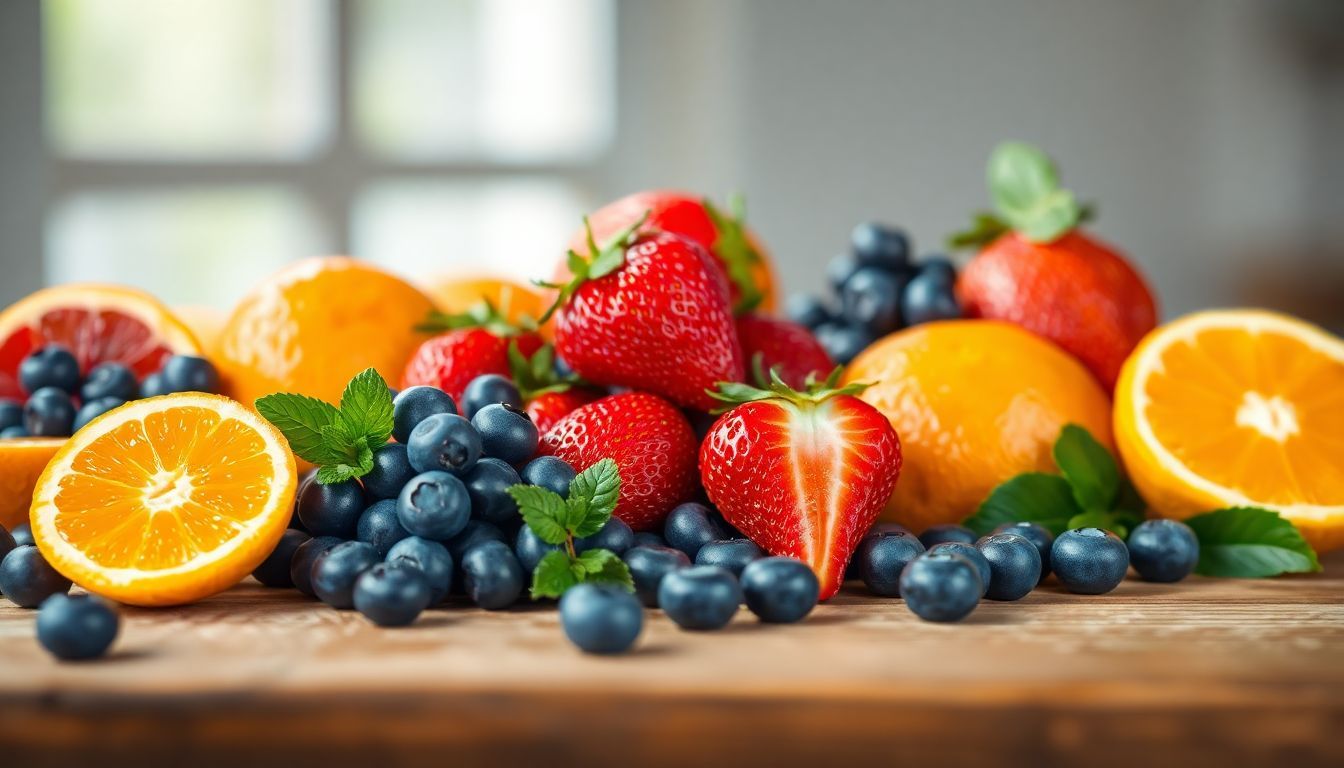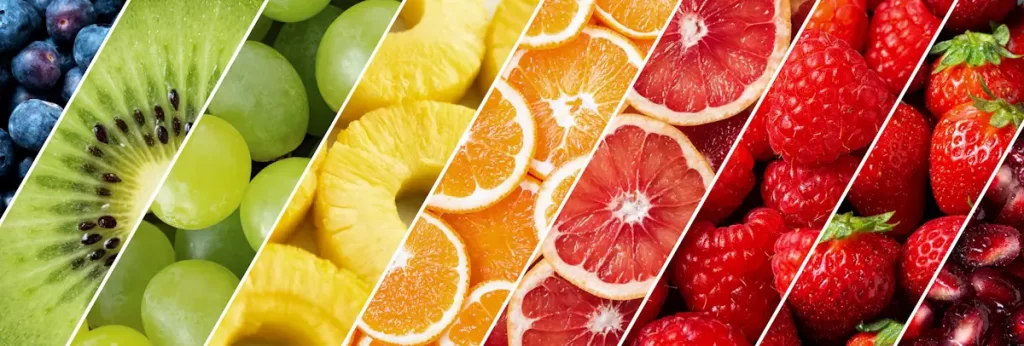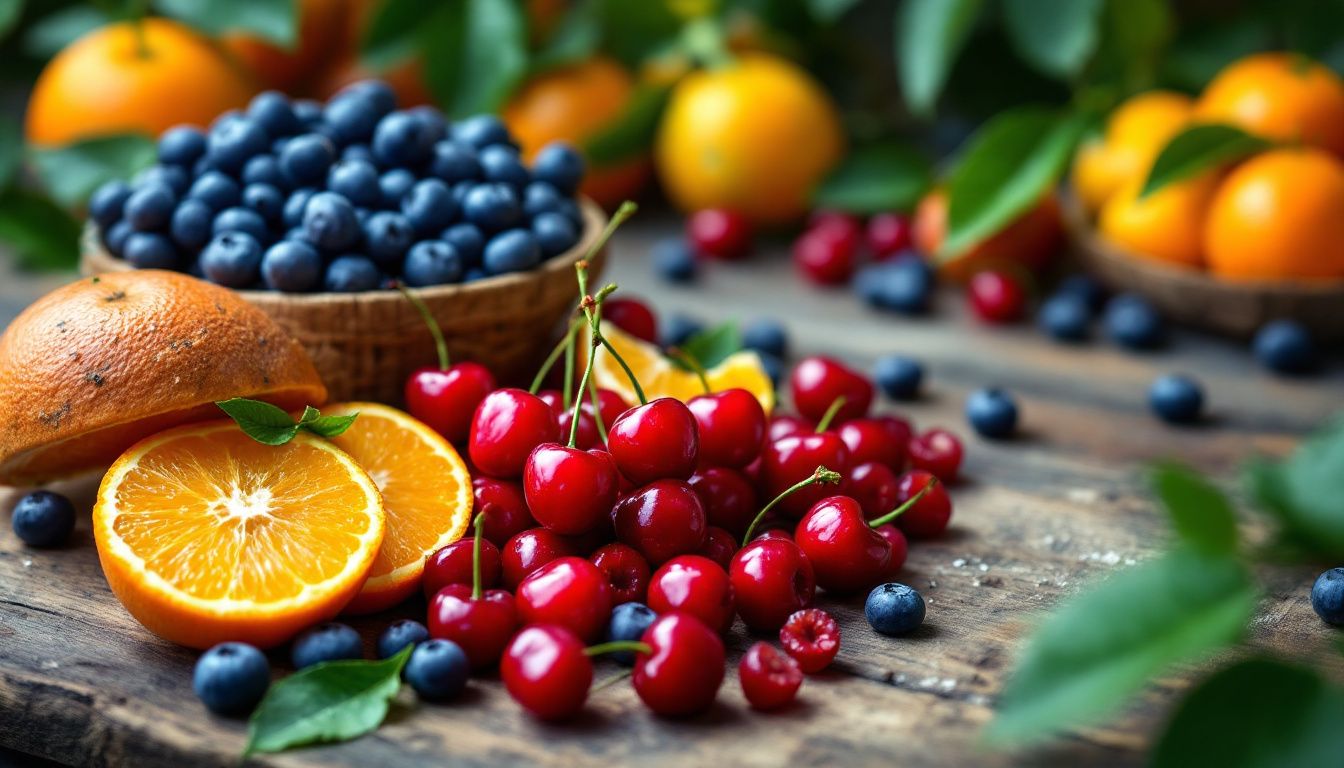Chronic inflammation can lead to serious health problems like heart disease and type 2 diabetes. Adding anti-inflammatory fruits to your diet can help reduce this risk. This blog will share the best fruits you can eat for better gut health, pain relief, and a stronger immune system.
Thank you for reading this post, don't forget to subscribe!Keep reading—you’ll want these fruits on your plate today!
Key Takeaways
- Cherries, rich in anthocyanins, ease muscle soreness and arthritis pain while lowering CRP levels, a marker of inflammation. Tart cherry juice can speed up recovery after exercise.
- Strawberries provide high vitamin C levels (98 mg per cup) and help reduce heart disease risks by lowering inflammatory markers in overweight adults.
- Blueberries improve brain health, boost cognitive fitness, and lower blood pressure. Eating one-third cup daily reduces chronic inflammation and supports the gut microbiome.
- Pineapple contains bromelain, an enzyme aiding digestion and reducing joint pain or swelling post-workout. It also fights free radicals with vitamin C for overall immune support.
- Avocados promote heart health with potassium, fiber, and monounsaturated fats—replacing butter or processed meat lowers cardiovascular risks by 16–22%.
Top Anti-Inflammatory Fruits to Include in Your Diet
Fruits can help fight inflammation and improve overall health. They are packed with nutrients, like vitamins, fiber, and antioxidants.
Cherries
Cherries are packed with anthocyanins, which fight off oxidative stress and inflammation. A 2022 review showed tart cherries can lower inflammatory proteins tied to chronic inflammation.
The Arthritis Foundation recommends them for easing arthritis and gout pain due to their anti-inflammatory compounds.
These fruits also help reduce muscle soreness after workouts, making them great for recovery. Their antioxidants work against free radicals in the body, supporting overall gut health and lowering c-reactive protein (CRP) levels—a key marker of inflammation.
Add sweet or tart cherries to your meals for these health benefits.
Tart cherry juice reduces muscle damage and speeds up recovery, says a study on post-exercise fatigue relief.
Strawberries
Their bright red color hints at their power. Packed with vitamin C, strawberries provide 98 mg in just one cup. That’s more than your daily need! These berries also contain anthocyanins, giving them strong anti-inflammatory properties.
Studies show they lower inflammatory markers connected to heart disease, especially for overweight adults. Eating them can support heart health and improve overall immune system function.
Their sweet taste makes them easy to enjoy—no added sugar needed!
Blueberries
Strawberries are great, but blueberries pack an anti-inflammatory punch too. These small berries are rich in anthocyanins, a type of antioxidant that reduces inflammation and fights free radicals.
Eating about one-third cup daily can lower your risk of chronic inflammation and heart disease.
A 2020 review in *Advances in Nutrition* found regular blueberry consumption helps decrease blood pressure. They also boost brain health, improving cognitive fitness over time. Add them to smoothies or snack mixes for an easy way to support your immune system while enjoying their sweet taste.
Pineapple
Pineapple stands out as a powerhouse for reducing inflammation. It contains bromelain, an enzyme that helps with joint pain and muscle recovery after workouts. A 2021 review in *Foods* highlighted bromelain’s potential to lower inflammatory markers and even suppress factors linked to cancer.
This makes it more than just a sweet tropical treat—it’s packed with anti-inflammatory compounds.
Its benefits don’t stop at pain relief or chronic inflammation. Pineapples also support digestion due to their natural enzymes, making them ideal for gut health. Adding this fruit to your diet can help fight free radicals while boosting your immune system.
Whether fresh or in smoothies, it’s a tasty way to enhance overall well-being!
Apples
Apples are loaded with soluble fiber, offering about 4 grams in a medium-sized fruit. This fiber supports gut health and helps lower inflammatory markers like c-reactive protein (CRP).
They also contain Vitamin C, which boosts the immune system and fights free radicals.
Eating apples regularly may cut the risk of chronic inflammation and cardiovascular disease. Their phenolic compounds provide anti-inflammatory benefits too. Adding an apple to your diet can aid in reducing risks linked to inflammatory diseases while supporting a healthy lifestyle.
Avocado
Avocados are packed with nutrients like potassium, magnesium, and fiber. They also have healthy monounsaturated fats that help reduce inflammation. A 12-week study found eating avocados lowered inflammatory markers like IL-1 and CRP in 51 adults.
These results suggest real benefits for overall health.
Replacing just half a serving of margarine, butter, or processed meat with avocado lowers cardiovascular disease risk by 16–22%. The creamy texture makes it easy to use in meals—from spreads to smoothies.
Next up: why cutting down on inflammation matters!

Why Reducing Inflammation Is Important
Chronic inflammation can harm your body over time, leading to serious health problems. Reducing it supports heart health, better digestion, and a stronger immune system.
Health benefits of an anti-inflammatory diet
Eating anti-inflammatory foods can lower markers of inflammation like C-reactive protein (CRP). This helps reduce the risk of heart disease, arthritis, and other chronic conditions.
Anti-inflammatory compounds found in fruits, fatty fish, and leafy greens help your body fight harmful free radicals.
This type of diet supports a healthy immune system and gut microbiome. It can also slow aging by reducing damage from proinflammatory cytokines. Studies show it helps manage metabolic syndrome and promotes cardiovascular health.
A well-balanced diet rich in these foods improves both energy levels and overall wellbeing.
Specific Benefits of Key Anti-Inflammatory Fruits
Certain fruits help fight inflammation in the body. They are rich in vitamins, minerals, and anti-inflammatory compounds that support overall health.
Cherries: Rich in antioxidants and reduce muscle inflammation
Cherries are packed with antioxidants that fight free radicals in the body. These powerful compounds help reduce muscle inflammation and pain. Tart cherry juice, for example, has been shown to lower C-reactive protein (CRP), an inflammatory marker, when consumed daily—16 ounces a day for 12 weeks worked wonders in older adults.
Both sweet and tart cherries also ease arthritis symptoms. Studies confirm their effectiveness at lowering joint swelling and stiffness. On top of that, regular intake of cherries can improve sleep quality thanks to their natural melatonin content.
Strawberries: High in vitamin C and heart health benefits
Strawberries stand out not just for their sweet taste but for their benefits to heart health. Packed with vitamin C, they help enhance HDL cholesterol—often called “good” cholesterol—and lower blood pressure.
This can reduce the risk of cardiovascular disease over time.
Their low glycemic index score of 40 makes them a smart choice for steady blood sugar levels. A 2018 research review also found that strawberries’ phytochemicals could delay cancer development and progression.
Adding these berries to your meals supports an anti-inflammatory diet while boosting overall wellness.
Blueberries: Boost cognitive functions and lower risk of heart disease
Strawberries may help your heart, but blueberries take it a step further. They can improve brain health and lower the chances of cardiovascular disease. Packed with antioxidants, these berries combat free radicals and reduce inflammation in the body.
A 2020 review in *Advances in Nutrition* showed regular blueberry consumption enhances blood flow and protects brain cells from damage. Studies suggest they support cognitive fitness, especially for older adults.
Blueberries also promote a healthy gut microbiome, which impacts overall health. Add them to your daily routine for both your heart and mind!
Pineapple: Contains bromelain, which aids in digestion and inflammation
Blueberries help the brain, but pineapple strengthens your gut. This tropical fruit is packed with bromelain, an enzyme that eases digestion and fights chronic inflammation. Bromelain also lowers swelling in muscles after workouts, as shown by a 2022 review in *Nutrients*.
Full of vitamin C, pineapple supports immune health and boosts iron absorption. It may ease arthritis pain due to its anti-inflammatory compounds. Add slices to smoothies or salads for a refreshing way to improve gut health while reducing inflammatory markers like c-reactive protein (CRP).

Apples: Rich in fiber and anti-inflammatory properties
Pineapple isn’t the only fruit packed with anti-inflammatory compounds. Apples, loaded with soluble fiber and antioxidants, reduce chronic inflammation effectively. Their polyphenols fight free radicals and protect your cells from damage caused by oxidative stress.
Quercetin in apples lowers inflammatory markers like c-reactive protein (CRP). Clinical trials prove apple polyphenol extracts improve endothelial function and lower risks of cardiovascular disease.
These same compounds support gut health by aiding good bacteria in the gut microbiome. Eating an apple regularly can even help manage weight gain while keeping your immune system strong.
Avocado: High in potassium and heart-healthy fats
Apples support heart health, and avocados take it a step further. Packed with potassium, they help regulate blood pressure and reduce cardiovascular risk. A 2022 study in the *Journal of the American Heart Association* found that swapping certain foods with avocado lowered the chance of heart disease by 16–22%.
Avocados also boast monounsaturated fats and beta-sitosterol, both good for cholesterol health. Each 100 grams offers about 76 mg of beta-sitosterol, which promotes healthy levels.
Their high fiber content enhances gut health while supporting overall cardiovascular wellness. Adding this creamy fruit to meals can be easy and rewarding!
How to Incorporate These Fruits into Your Diet
Make these fruits a part of your daily meals with simple ideas and small changes. Enjoy them fresh, blend them, or mix them into dishes for a tasty boost to your diet.
Smoothies and Juices
Blend anti-inflammatory fruits like tart cherries, blueberries, and strawberries for a nutrient-packed smoothie. Add dark leafy greens and vitamin D-rich foods to boost gut health and lower inflammatory markers like c-reactive protein (CRP).
An Anti-Inflammatory Cherry-Spinach Smoothie offers pain relief while nourishing your immune system.
Juices can replace sugar-sweetened beverages in your diet. Combine pineapple, apples, or citrus fruits for refreshing options rich in vitamin C and phenolic compounds. These drinks support cardiovascular health, reduce chronic inflammation, and fight free radicals effectively.
Fresh Fruit Salads
A fresh fruit salad is a simple way to enjoy anti-inflammatory foods. Combine watermelon, muskmelon, kiwi, grapes, and mango for a refreshing mix. This blend can support weight loss and improve immune function while reducing heart disease risks.
Add apples, avocado slices, or citrus fruits like oranges for extra nutrients. These options provide fiber, vitamin C, and monounsaturated fats that boost gut health and fight chronic inflammation.
Keep it healthy by avoiding sugar-sweetened dressings—stick with natural flavors from the fruits themselves!
Desserts and Baking
Fresh fruits shine in desserts too. They make dishes healthier and more vibrant. Lemon-Blueberry Poke Cake combines citrus fruits with anti-inflammatory blueberries for a sweet treat.
Oatmeal Cookie Fruit Pizza uses whole grains, fiber-rich apples, and strawberries full of vitamin C to boost gut health while satisfying cravings.
Avocados add creaminess to baked goods like brownies or cakes—offering heart-healthy fats instead of butter. Pomegranate seeds pair well with dark chocolate for proanthocyanidins that fight free radicals.
These options inspire indulging without guilt, balancing sweetness and inflammation reduction through smarter choices.
Snacks and Appetizers
Berries make great snacks. Prepare a platter with strawberries, blueberries, cranberries, and blackberries. They are rich in anti-inflammatory compounds and antioxidants that fight free radicals.
Pair them with a handful of nuts for added protein and healthy fats.
Vegetable sticks served with avocado dip add crunch to your day. The monounsaturated fats in avocados reduce inflammatory markers like c-reactive protein (CRP). Combine carrots, celery, or bell peppers for extra gut health benefits—simple and tasty!
Conclusion
Eating anti-inflammatory fruits can boost your health in many ways. They fight inflammation, support your heart, and improve digestion. Adding options like cherries, blueberries, and avocados to meals is simple and tasty.
These fruits work with other healthy foods for better wellness. Start eating them today for long-term benefits!
For more information on how to complement your anti-inflammatory diet with proper calcium intake, visit our guide on choosing the right calcium supplement.
